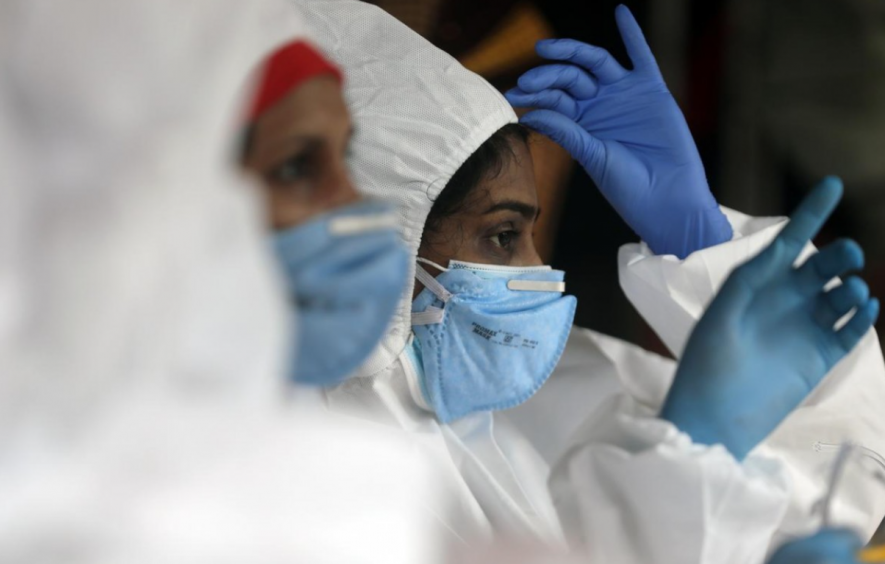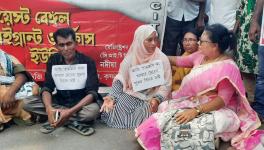Bengal: Nursing Staff Wary About Working Conditions, Especially Post-RG Kar Incident

Representational Image
Kolkata: “Abhaya’s (the R G Kar Hospital junior doctor who was found dead in the hospital premises last year) death has opened our eyes. It has shown how helpless we are against the powers that be which control the state’s health system”, said Minati D (name changed), nursing staff with a teaching hospital in Kolkata.
“I have been at the forefront of the Abhaya protest and have received numerous oral threats from the TMCP (ruling Trinamool Congress students front) students of our hospital. Though Abhaya’s death brought us to the streets, our protest is against the system. An ANM (auxiliary nurse midwife) cannot expect proper changing rooms and proper working conditions in most of the hospitals of the state”, she told this reporter, adding that “as women we demand better treatment, but most of the CMOHs (Chief Medical Officers of Health) are forgetting their responsibility to provide a threat- free atmosphere to the nursing staff”.
Elaborating the long hours that they put in service, the nurse said: “We get up at 5 in morning when on morning duty, catch a bus to our workplaces, where even changing rooms are not provided. Even in places where there are changing rooms, those are usually cramped small rooms, sometimes with over 100 nursing staff. We have to wait for our turn, while the duty roster automatically starts ticking, and in many cases, the superintendents do not pay any attention to this dire condition of the nursing staff”.
Minati said in most district hospitals, whenever a patient dies, the nursing staff along with the junior doctors face the threat of being beaten up. In many cases, the nursing staff also face molestation by the kin of the patients, which goes unnoticed as the nurses are hesitant to go to the police to enlist their complaints.
“There is supposed to be police presence in each hospital in the state, but most of the hospitals lack adequate police strength. As a result, in the face of angry relatives, the police retreat, exposing junior doctors and nursing staff to their wrath. Most such cases happen when a patient’s kin are linked with the ruling party,” she added.
If the condition of ANM and the GNM (general nursing midwifery) nurses is such in Kolkata-based hospitals, once can well imagine their condition in rural hospitals, which have lack of medicines, bandages and proper doctors.
As a result, it is the nurses who are left to face the ire of angry patient parties, as they have to work 24x7 to keep the rural hospitals running, she said,
The nurse also complained that promotions are not often seniority based and are often based on who is close to the ruling party, which affects the working conditions of rural hospitals.
On an average, a nurse clocks more than 100 hours of work in their thankless jobs, especially in rural hospitals, rued Pratima Mullick (name changed), GNM nurse, as punitive measures are regularly taken by the authorities against nurses at the slightest provocation.
She alleged that corruption in the health system starts from day one of the GNM training course, where, under the present ruling dispensation, huge money is taken to give pass marks to nursing trainees, or their closeness to ruling party is considered as a criterion for appointing as GNM nurse.
Pratima alleged that of late, in the lieu of money, the state administration has appointed Bangalore-based nursing training colleges to supply trained nurses to state hospitals, often sidelining the merit-based nursing institutions of West Bengal.
As a result, most of the new joinees lack sufficient training and cannot even give injections to patients, she alleged, adding that it was only after three to four years of ‘on the job’ training that the new staff become capable.
The rape-murder of Abhaya “has opened our eyes and this is the time to protest and register our protests and claims to the higher courts to take cognizance of our working conditions and put a better system in place,” she said.
Pratima said families who have money to pay for nursing courses in Bangalore for their daughters to become accredited nurses, courtesy the agreement with the state nursing council, are at an advantage.
“Meritorious students who belong to not so well-off families rot in the state. Even after putting their best efforts in the state's merit-based system, they do not get adequate jobs in government facilities and often are forced to venture out of the state, sometimes even to foreign shores, where they face exploitation”, she added.
Mallika Ghosh, another GNM nurse with a prominent hospital in Medinipur, rued about the punitive measures that the state government was taking in the case of the spurious saline incident in the Midnapore Medical College, where spurious saline was said to be the reason of the death of a mother, even as the state government is trying to blame human error.
“The situation of medicines and saline is bad as the contractors who supply these are close to the ruling party,” she alleged.
She said everywhere in the system, there are “hidden elements” like Sandip Ghosh, “the notorious administrator of the RG Kar case.”
The nurse also alleged that the North Bengal lobby of the health system was very much responsible for nepotism over postings. “No complaints are tolerated by the highest body of medical echelon of the state, the Swasthya Bhawan, on nepotism factors at work during promotional postings of nurses. I have been waiting for my promotional posting for years, all because I am not close to the ruling lobby,” she alleged.
She said her “closeness to the nurses association is what they are fearful of.”
Get the latest reports & analysis with people's perspective on Protests, movements & deep analytical videos, discussions of the current affairs in your Telegram app. Subscribe to NewsClick's Telegram channel & get Real-Time updates on stories, as they get published on our website.
























